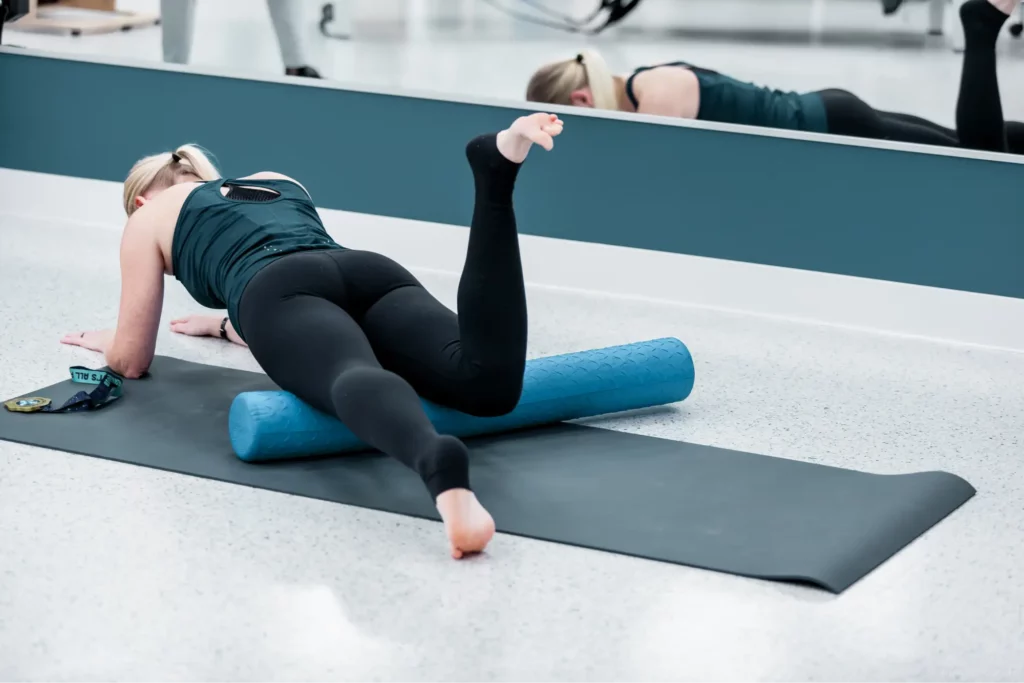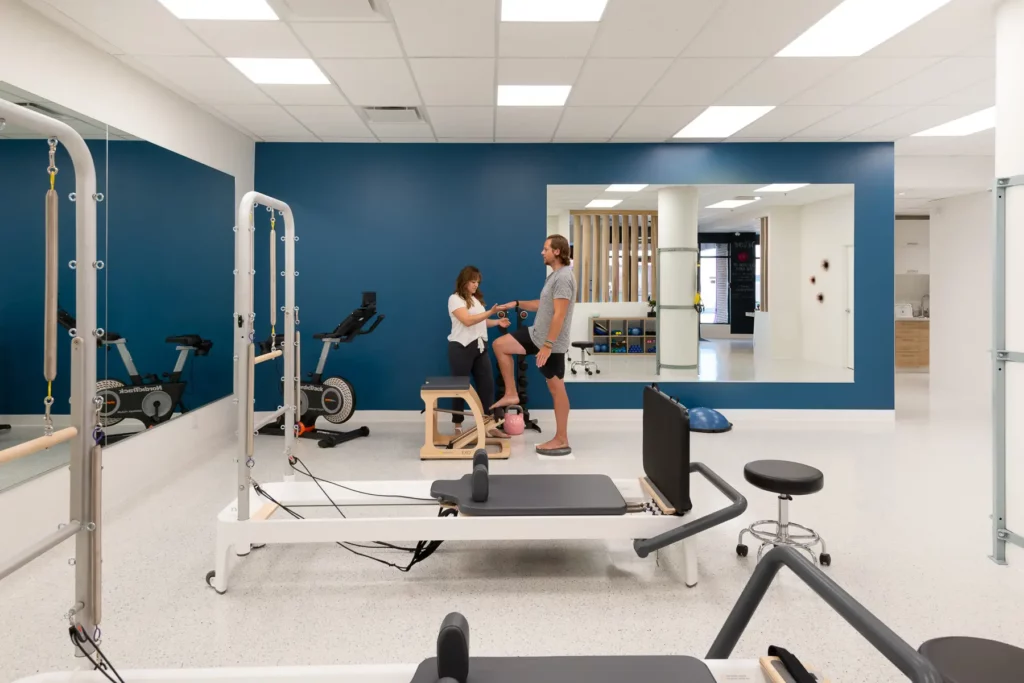Physiotherapy can be a crucial part of your journey through surgery.
Before surgery, pre-operative physiotherapy aims to prepare your body for the upcoming procedure. It involves exercises and treatments specifically designed to improve your surgical outcomes. By strengthening your body, enhancing your physical well-being, and mentally preparing you for surgery, pre-operative physiotherapy sets the stage for a smoother recovery.
After surgery, the focus shifts to post-operative physiotherapy, which is essential for your rehabilitation. This phase of care helps you recover strength, flexibility, and function. The goal of post-operative physiotherapy is to reduce pain and swelling, promote healing, and accelerate your return to daily activities.
By committing to both pre and post-operative rehabilitation, you’re taking an active role in ensuring the best possible results from your surgery. Your physiotherapist will guide you through each step, equipping you with the tools and knowledge needed to regain your pre-surgery level of function, or perhaps even surpass it. Whether you’re preparing for surgery or going through the recovery process, physiotherapy is a partner in your health journey.
Understanding Physiotherapy in Surgery
In the journey of surgical treatment, physiotherapy plays a crucial dual role. Before surgery, it prepares your body for the procedure, known as pre-habilitation, and after surgery, it aids your recovery, focusing on restoring function and quality of life.
Benefits of Pre-Operative Physiotherapy
Your physiotherapy journey often begins before you enter the operating room. A tailored pre-operative physiotherapy program equips your body for the upcoming surgery, enhancing your physical readiness which can lead to better surgical outcomes. Physiotherapists assess your strength and flexibility, identifying areas that need conditioning to support your recovery.
- Pre-habilitation aspects include:
- Improving muscle strength
- Increasing joint mobility
- Educating you about post-surgery exercises
Benefits of Post-Operative Physiotherapy
Once the surgery is complete, post-operative physiotherapy takes center stage. Its benefits are vital for a smooth and accelerated recovery path, ensuring that you regain function and bounce back to your daily activities as swiftly as possible.
- Goals of post-operative care:
- Enhancing circulation to promote healing
- Preventing blood clots
- Reducing pain and swelling
- Restoring optimal movement patterns

Overall Objectives of Surgery-Related Physiotherapy
The overarching aim of surgery-related physiotherapy is to optimize your health outcomes. By engaging with professional physiotherapists, you’ll be taking an active role in your recovery process. Here’s a look at the primary objectives:
- Key Objectives:
- Minimize post-operative complications
- Maximize surgical outcomes
- Facilitate a quicker return to function
- Improve long-term quality of life
Each stage of physiotherapy is integral to a successful surgical journey—both preparing your body beforehand and supporting it afterward. By embracing these practices, you’re setting the stage for the best possible results post-surgery.
Pre-Surgery Approaches
Before you undergo surgery, it’s critical to focus on preparation strategies that can support an optimal outcome. These include a thorough assessment, a tailored prehabilitation program, and managing expectations to support your mental health.
Assessment and Education
Your pre-operative journey begins with a comprehensive assessment by a physiotherapist to identify your baseline strength, mobility, and physical function. This step is crucial in designing an exercise program that’s tailor-made for your needs. Alongside assessment, you’ll receive education on the surgery, its potential impacts, and the rehabilitation process. This knowledge empowers you and contributes to a more confident approach to your surgery and recovery.
Prehabilitation: Exercise and Fitness
Prehabilitation involves a structured exercise prescription focused on increasing your fitness and strength pre-surgery. A thoughtful blend of aerobic and resistance exercises will help bolster your physical condition, ensuring you’re in the best possible shape to face your operation and expedite your recovery. Assessing and treating any muscle imbalances, weaknesses, and joint concerns will also help improve your overall function before and after surgery.
RELATED READING: Clinical Pilates: 10 Health Benefits
Managing Expectations and Mental Health
It’s not uncommon to feel anxious or uncertain about an upcoming surgery. That’s why managing your expectations through clear communication and setting realistic recovery goals is essential. Addressing your mental health is just as important as preparing your body; understanding the process and the post-surgery journey can alleviate stress and contribute to better overall outcomes. Your Physiotherapist can also help prepare you to ask the right questions of your surgeon and support effective collaborative care. Remember, a positive mindset and external support can be powerful in your recovery toolkit.

Post-Surgery Recovery
Following surgery, your recovery phase is crucial. Specific physiotherapy strategies and exercises can greatly enhance your return to normal function and mobility, reducing the risk of complications and managing pain effectively.
Immediate Post-Operative Care
Directly after surgery, immediate post-operative care aims to get you moving as soon as it’s safe to do so. Starting with simple exercises can significantly help to increase your range of motion and facilitate circulation. This early mobilization reduces the risks of blood clots and respiratory complications. A study on cardiac surgery patients demonstrated that preoperative physical therapy, including exercise, reduces postoperative pulmonary complications.
Long-Term Recovery Planning
As you progress, long-term recovery planning becomes more personalized. Your physical therapist will design a specific plan to steadily improve your mobility and strength. This often includes exercises that you’ll need to perform regularly at home. Your program will be tailored to your unique situation, taking into account the type of surgery you had and your unique goals for maximal recovery of physical function and societal participation.
Addressing Complications and Risk Management
Effective post-operative physiotherapy is not just about improving motion and strength; it’s also about risk management. Your therapist will watch for signs of any complications such as infection or unusual pain and will work with you to mitigate these risks. It’s vital to communicate openly about any discomfort or concerns as early intervention can prevent more serious issues. Focusing on exercises that promote mobility and recovery, while managing pain, are key for a successful return to daily activities.
Your recovery will be a journey, and it’s important to approach it with patience and consistency, always listening to your body and working in collaboration with your healthcare providers. If you’re looking for pre or post operative physiotherapy in Vancouver, come visit the team at Reformotiv Physio + Pilates

